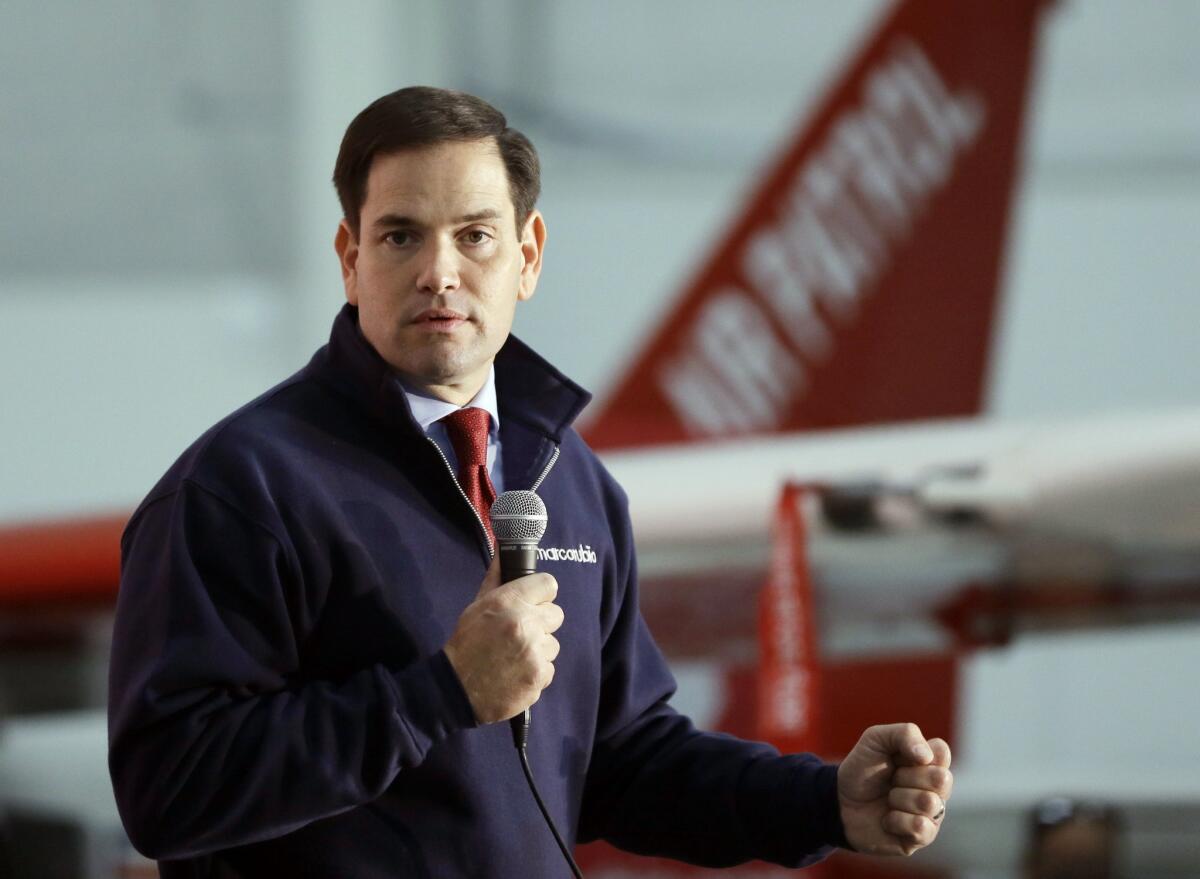Column: No, Marco Rubio didn’t score a blow against Obamacare -- he merely hurt patients

Republican presidential candidate Sen. Marco Rubio (R-Fla.) campaigning this week: What is he really bragging about?
- Share via
Sen. Marco Rubio’s presidential campaign has been crowing lately about the blow he supposedly scored against the Affordable Care Act. “Only one candidate has actually done significant damage to Obamacare,” boasts his campaign website.
The candidate himself claims to have “saved the American taxpayer $2.5 billion.” The New York Times -- excuse me, “even” the New York Times -- credits Rubio with slipping “a little-noticed” provision into a spending bill last year to achieve this aim.
These claims are a little overheated, wholly misleading and spectacularly cynical. Let’s set the record straight.
Marco Rubio hasn’t killed Obamacare and he hasn’t saved taxpayers any money. All he’s done is throw a wrench in the works.
— Nicholas Bagley, University of Michigan
Rubio’s provision, which indeed was slipped onto page 892 of the 1,603-page spending bill last December, dealt with the risk corridor provisions of the Affordable Care Act. (By the way, when a newspaper states that something was “little-noticed,” it means unnoticed by itself. But we noticed it, and we weren’t alone.)
Risk corridors were designed to stabilize insurance premiums in the first few years of the ACA. The drafters understood that health insurers would have difficulty pricing their plans in the individual market in those first years. Not only would some insurers be entering that market in volume for the first time, but the market itself would be dramatically altered by the flood of new customers, as well as the law’s prohibition on exclusions for preexisting conditions. Some insurers would set their premiums too low, and therefore pay out benefits higher than they anticipated; others would set their rates too high, and capture a windfall.
That’s exactly what has happened. Without a safety valve, these miscalculations could have an impact on premiums the following year, as insurers tried to adjust.
Under the risk corridor provision, insurers that set prices more than 3% below a set target would get a reimbursement from the government, and those that overpriced by the same margin would pay some of the windfall to the government. The arrangement expires after next year, when it’s assumed that insurers will know what they’re doing.
Rubio started grousing about the risk corridors in 2013, when he called the arrangement a “bailout” of insurers. We labeled that claim the most cynical attack on the ACA up to that point, because as Rubio well knew the provision’s purpose was consumer protection, not corporate protection. Indeed, a similar arrangement had been written into Medicare Part D, the prescription drug benefit enacted by a Republican Congress in 2003.
Rubio’s spending-bill provision was aimed at what Nicholas Bagley of the University of Michigan law school described as “a serious flaw: the ACA didn’t appropriate any money to fund it.” The administration’s workaround was that the Department of Health and Human Services would use the money that came from profitable plans to make payments to cover the losses of unprofitable plans.
Rubio’s rider prohibits the use of any other federal funds to cover the shortfall. In 2014 there was a shortfall. Consequently, Health and Human Services has informed the plans owed money that they’ll get only 12.6 cents on the dollar of what they’re owed -- $362 million to cover claims of $2.87 billion. The administration hopes to make it up from money due profitable plans this year and next, but no one can be sure there will be enough.
What’s important, however, is that the obligation to those plans hasn’t been extinguished. Bagley points out that health plans owed money have the right to sue the government in the U.S. Court of Claims, which can order them to be repaid; the position of Health and Human Services is that the claims are valid as an obligation of the U.S. government. If the court upholds them, the taxpayer hasn’t saved a dime.
In the meantime, however, Rubio’s provision has undeniably produced pain, especially among nonprofit co-op health plans that were created under the ACA to provide competition in some state marketplaces. In terms of enrollment, some of these plans were immensely successful -- the co-op serving Iowa and Nebraska had 80,000 customers last year, nearly eight times what it expected. But they tended to be financially shaky, as was expected at first.
They’ve been devastated by the shortfall in risk corridor funds. As healthcare expert Timothy Jost reported, the Colorado co-op got only $184,000 on its nearly $16 million in risk corridor claims; Kentucky’s recovered only $9.7 million of $77 million in claims. The Iowa-Nebraska co-op got $16 million to cover $140 million in claims. The New York Freelancers CO-OP received about $19 million on $150 million in claims. So they’ve shut down, leaving their patients high and dry.
As Bagley states, “Marco Rubio hasn’t killed Obamacare and he hasn’t saved taxpayers any money. All he’s done is throw a wrench in the works.”
Indeed, as health insurance guru Richard Mayhew of Balloon-Juice points out, the Rubio rider is worse than an innocuous complication for the ACA; it actually will cost taxpayers money. That’s because (among other things) the disappearance of the co-ops will reduce competition in their old markets, raising premiums and requiring the government to spend more in premium subsidies for the buyers eligible for them--more than 80% of the buyers.
Was this predictable? Of course it was: the risk corridors were obviously designed to benefit insurers with lower financial resources than the big companies, which can afford to wait a couple of years for their rebates. This is how fiscal responsibility disappears in the face of political expedience.
Rubio has shown that if you want to punch a hole in the Affordable Care Act, you can do so. But we knew that; Republican governors and legislators in the 20 states that have refused to expand Medicaid to serve their constituents under the ACA already showed it. But who’s hurt by such stunts? People are. Wasn’t Marco Rubio elected to serve them? If so, what exactly is he bragging about?
Keep up to date with Michael Hiltzik. Follow @hiltzikm on Twitter, see our Facebook page, or email [email protected].
MORE FROM MICHAEL HILTZIK
Do we need Obamacare’s ‘Cadillac tax’? Yes--and no.
One-sixth of Americans have trouble paying medical bills. That’s good news.
Forget the Zack Greinke deal. Major league ballplayers are getting ripped off.
More to Read
Inside the business of entertainment
The Wide Shot brings you news, analysis and insights on everything from streaming wars to production — and what it all means for the future.
You may occasionally receive promotional content from the Los Angeles Times.











